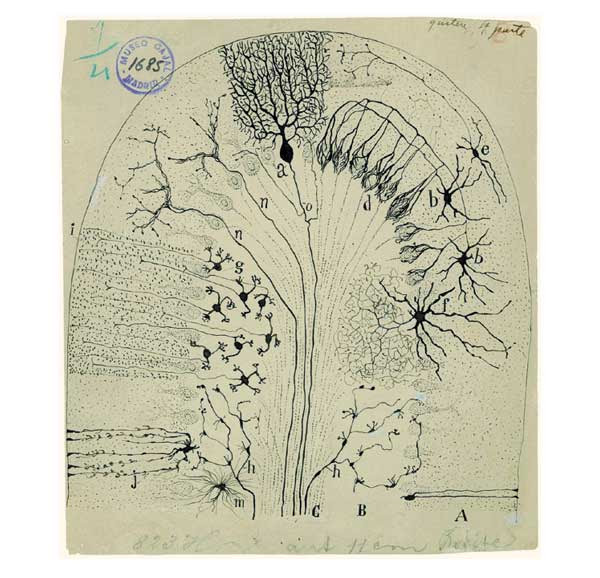
Glutamatergic cerebellar neurons differentially contribute to the acquisition of motor and social behaviors
#Biomedicine #Neuroscience #Brain #Neurology #Cerebellum #GlutamatergicNeuron #MotorCoordination #MotorBehavior #SocialBehavior #Ataxia #CerebellarCognitiveAffectiveSyndrome
Two Types of Neurons in Cerebellum Influence Motor and Social Behaviors
Researchers reveal distinct roles for two types of neurons in the cerebellum. The study offers compelling in vivo evidence that a specific group of excitatory glutamatergic neurons plays a key role in acquiring motor and sensory/emotional behaviors.
Additionally, the study demonstrates that neurons located in different regions of the cerebellum differently contribute to motor and non-motor behaviors during development and adulthood.
#Biomedicine #Neuroscience #Brain #Neurology #Cerebellum #MotorCoordination #Ataxia #SocialBehavior
https://neurosciencenews.com/cerebellum-neurons-behavior-23244/
Halting Alzheimer’s Progression: Synapses Transport Toxic Proteins
A new study uncovers how synapses transport toxic tau protein oligomers, contributing to Alzheimer's progression. This discovery paves the way for strategies to halt disease progression, a beacon of hope for Alzheimer's patients.
#Biomedicine #Neuroscience #Brain #Neurology #NeurologicalDiseases #NeurodegenerativeDiseases #Neurodegeneration #Alzheimer #Tau #Synapses
Genes reveal surprising overlaps in brain diseases and disorders
Scientists find patterns in how disease-related genes switch on in the brain.
The study authors say this way of sorting brain diseases and psychiatric disorders could potentially identify new targets for treatments.
#Neuroscience #Brain #Neurology #NeurologicalDiseases #Psychiatry #PsychiatricDiseases #MentalDiseases #NeurodegenerativeDiseases #Neurodegeneration #BrainDiseases #NeurogeneticDiseases #Neurogenetics #Transcriptome #Transcriptomics #Genomics #MolecularBiology #Biomedicine
https://alleninstitute.org/news/genes-reveal-surprising-overlaps-in-brain-diseases-and-disorders/
A comparison of anatomic and cellular transcriptome structures across 40 human brain diseases
Analysis of 40 common human brain diseases identifies 5 major transcriptional patterns, representing tumor-related, neurodegenerative, psychiatric and substance abuse, and 2 mixed groups of diseases affecting basal ganglia and hypothalamus.
#Neuroscience #Brain #Neurology #NeurologicalDiseases #Psychiatry #PsychiatricDiseases #MentalDiseases #NeurodegenerativeDiseases #Neurodegeneration #NeurogeneticDiseases #Neurogenetics #Transcriptome #Transcriptomics #Genomics #MolecularBiology #Biomedicine
https://journals.plos.org/plosbiology/article?id=10.1371/journal.pbio.3002058
El Sistema de Ciencia y Tecnología español a través de sus universidades
#Ciencia #Investigación #EducaciónSuperior #Universidad #PolíticaCientífica #PolíticaUniversitaria
Exercise and the Brain: The Neuroscience of Fitness Explored
Regular exercise profoundly impacts our brain and nervous system.
Exercise stimulates neurogenesis – the creation of new neurons – primarily in the hippocampus, influencing memory and learning while increasing key mood-regulating neurotransmitters. It also enhances brain plasticity, essential for recovery from injury and aging, and improves cognitive functions such as attention and memory.
#Biomedicine #Neuroscience #Brain #Neurology #BrainPlasticity #Neurogenesis #Hippocampus #Learning #Memory #CognitiveFunction #Exercise #Fitness
Harmony in the Brain: Unraveling the Neuroscience of Music
Primer borrador del pangenoma humano
Tras dos décadas con un genoma humano de referencia, de carácter lineal y basado en pocas personas, ahora se presenta una colección más completa de secuencias genómicas que capta mucho mejor la diversidad humana. La nueva versión combina material genético de 47 individuos de diversas partes del mundo, pero serán 350 el próximo año, lo que ayudará a estudiar mejor las enfermedades genéticas.
#Biomedicina #Biología #CienciasdelaVida #Genética #Genómica #Genoma #GenomaHumano #Pangenoma #PangenomaHumano #EnfermedadesGenéticas #EnfermedadesHereditarias #DiversidadHumana
https://www.agenciasinc.es/Noticias/Primer-borrador-del-pangenoma-humano
Ciencia de la Comunicación Científica
Proyecto dirigido a mejorar la calidad e impacto de la comunicación científica a través del impulso de una comunicación más eficaz, ética y profesional.
#Ciencia #ComunicaciónCientífica #DivulgaciónCientífica #ComunicaCiencia #PeriodismoCientífico
La Fundación Española para la Ciencia y la Tecnología (FECYT) lanza una web dedicada a la “Ciencia de la Comunicación Científica”. En el ámbito de este proyecto se analiza el estado de la comunicación científica en nuestro país con el objetivo de orientar la estrategia futura en este ámbito, proporcionar herramientas y recursos; y crear un espacio de reflexión, aprendizaje y colaboración mutuas entre investigación y práctica. El objetivo final es mejorar la calidad e impacto de la comunicación de la ciencia.
#Ciencia #ComunicaciónCientífica #DivulgaciónCientífica #ComunicaCiencia #PeriodismoCientífico
Inhalar mentol mejora la función cognitiva en ratones utilizados como modelo del Alzheimer
#Neurociencia #Cerebro #Neurología #EnfermedadesNeurológicas #EnfermedadesNeurodegenerativas #Neurodegeneración #DeterioroCognitivo #Cognición #Memoria #Alzheimer #Mentol #Biomedicina #Olfato #Neuroinflamación #Inflamación #Neuroimmunología #RespuestaInmune #Inmunología
In situ continuous Dopa supply by responsive artificial enzyme for the treatment of Parkinson’s disease
#Neuroscience #Brain #Neurology #NeurologicalDiseases #NeurodegenerativeDiseases #Neurodegeneration #Parkinson #DOPA #FunctionalNucleicAcid #ArtificialEnzyme #Enzyme #Biotechnology #Biomedicine
An in vivo neuroimmune organoid model to study human microglia phenotypes
#Neuroscience #Brain #Neurology #NeurologicalDiseases #NeurodegenerativeDiseases #Neurodegeneration #BrainOrganoid #Organoid #NeuroimmuneOrganoid
#Microglia #Neuroimmune #Neuroimmunology
Human Brain Organoids Reveal How Microglia Develop and Function
Researchers have developed human brain organoids that contain microglia, the immune cells of the brain.
The researchers found that microglia are influenced by the environment in which they develop and that they play a role in both development and disease.
#Neuroscience #Brain #Neurology #NeurologicalDiseases #NeurodegenerativeDiseases #Neurodegeneration #BrainOrganoid #Organoid
#Microglia #Neuroimmune #Neuroimmunology
Hallan una proteína implicada en el desarrollo de la esquizofrenia
Un equipo del CSIC descubre que la proteína CPEB4, un regulador de genes involucrados en la actividad neuronal, está alterada en esta patología contribuyendo a su desarrollo
#Neurociencia #Cerebro #Neurología #EnfermedadesNeurológicas #EnfermedadesNeuropsoquiátricas #EnfermedadesPsiquiátricas #Psiquiatría #Esquizofrenia #CPEB4
Abundant Aβ fibrils in ultracentrifugal supernatants of aqueous extracts from Alzheimer’s disease brains
#Neuroscience #Brain #Neurology #NeurologicalDiseases #NeurodegenerativeDiseases #Neurodegeneration #Astrocyte #Neuron #Alzheimer #CognitiveDecline #CognitiveDysfunction #MemoryLoss #BetaAmyloid #AmyloidFibrils #Aβ #AβFibrils #Immunotherapy #Lecanemab
Alzheimer’s Drug Lecanemab Shields Brain from Free-Roaming Amyloid Fibrils
Amyloid beta protein forms small aggregates that disrupt brain function in Alzheimer’s disease.
Lecanemab, a recently FDA-approved Alzheimer’s treatment, can neutralize these disruptive aggregates, hinting at its potential to slow down the disease’s cognitive decline.
#Neuroscience #Brain #Neurology #NeurologicalDiseases #NeurodegenerativeDiseases #Neurodegeneration #Astrocyte #Neuron #Alzheimer #CognitiveDecline #CognitiveDysfunction #MemoryLoss #BetaAmyloid #AmyloidFibrils #Immunotherapy #Lecanemab
https://neurosciencenews.com/amyloid-fibril-neuropharmacology-23207/
Un nuevo tratamiento contra el alzhéimer podría aminorar la pérdida de memoria
Se ha revelado el modo en que los agregados de beta amiloides flotan por el líquido tisular cerebral, llegan a muchas regiones y pueden alterar el funcionamiento de las neuronas. Además, hay evidencia de que el fármaco lecanemab, recientemente aprobado por la FDA como tratamiento de esta enfermedad neurodegenerativa, podría contribuir a neutralizarlos.
#Neurociencia #Cerebro #Neurología #EnfermedadesNeurológicas #EnfermedadesNeurodegenerativas #Neurodegeneración #Demencia #Alzheimer #BetaAmiloide #Inmunoterapia
El nuevo fármaco contra el Alzheimer puede impedir que las fibrillas beta amiloides flotantes dañen el cerebro
#Neurociencia #Cerebro #Neurología #EnfermedadesNeurológicas #EnfermedadesNeurodegenerativas #Neurodegeneración #Demencia #Alzheimer #BetaAmiloide #Inmunoterapia
Professor at #UniversidadAutonomadeMadrid #UAM
#Research in #Biomedicine #BrainDiseases #NeurodegenerativeDiseases #Ataxias
🧠🔬🧬
Enthusiastic about #OpenScience and #SciComm
Concerned about #SciencePolicy
Promoting #HumanRights
LGT(B)Q+🌈 #DiversityInSTEM #LGTBQ+ #LGBTQSTEM #PrideinSTEM
Very interested in #Music #Art #Dance #SciArt #NeuroArt #BrainArt
